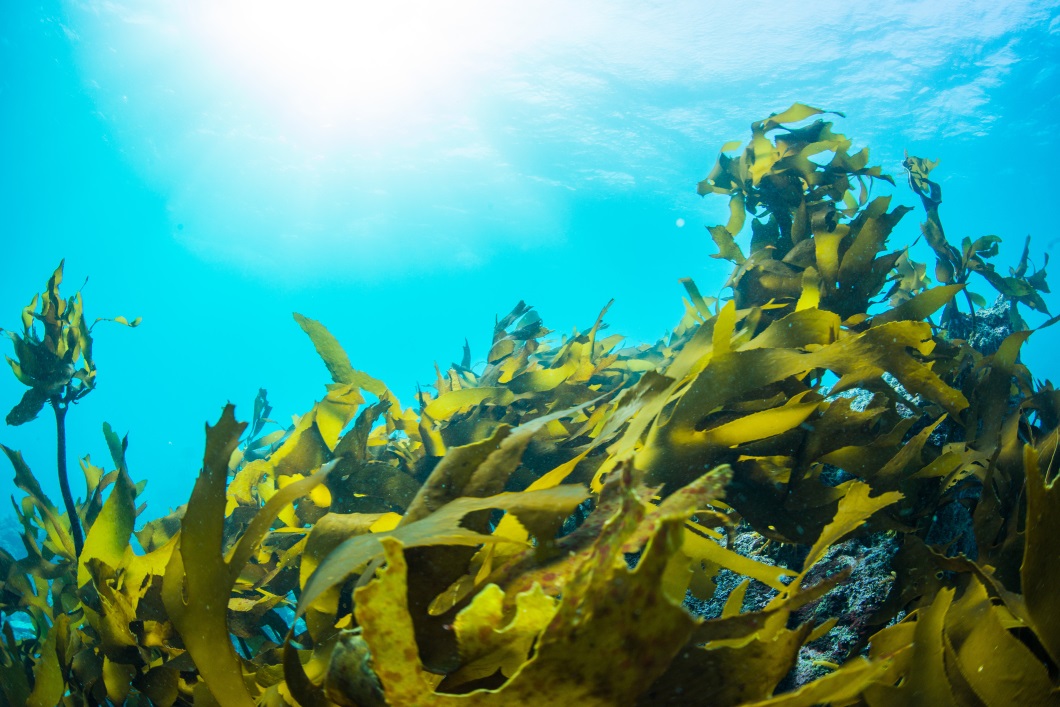Fucoidan, a sulfated polysaccharide, has shown antitumor effects, and research is being conducted to pinpoint the active components behind this. In this blog, I would like to present a study, “Anticancer and Antitumor Potential of Fucoidan and Fucoxanthin, Two Main Metabolites Isolated from Brown Algae” by Soheil Zorofchian Moghadamtousi et al. The study offers an in-depth account of the anti-cancer and anti-tumor properties of fucoidan and fucoxanthin, two primary metabolites extracted from brown algae. These metabolites, considered the key active components of brown algae, have shown promise as potential agents for chemotherapy or chemoprevention.
Fucoidan is a type of sulfated polysaccharide rich in fucose found in the extracellular matrix of brown algae. Fucoidan has shown various biological activities, including antiviral, anti-inflammatory, anticoagulant, antiangiogenic, immunomodulatory, and anti-adhesive activities. The biological effects of this compound differ based on the species it is derived from due to potential variations in chemical structure. Therefore, fucoidan, a sulfated heteropolysaccharide with fucose, exhibits varying structures depending on the species of origin.
Additionally, fucoidan’s components vary depending on the species, including minor levels of D-mannose, D-xylose, D-galactose, and uronic acid. In the 1980s, studies of fucoidan in xenograft mouse models revealed antitumor and antimetastatic effects, attracting the attention of researchers. The antitumor activity of 31 polysaccharide fractions isolated from S. thunbergii against Ehrlich carcinoma transplanted in mice was evaluated, revealing the antitumor properties of fucoidan or L-fucan, which contains approximately 30% sulfate ester groups, less than 2% protein, and approximately 10% uronic acid per fucose residue.
Research has shown that fucoidan extracted from Fucus vesiculosus exhibits potent antiangiogenic effects by inhibiting tube formation in human umbilical vein endothelial cells (HUVECs), with its inhibitory potency further enhanced through chemical over-sulfation. Both native fucoidan and over-sulfated fucoidan significantly reduced the chemotactic and mitogenic effects of vascular endothelial growth factor 165 (VEGF165) on HUVECs through their antagonistic effects on the binding of VEGF165 to its cell surface receptor, but over-sulfated fucoidan showed a stronger inhibitory effect, suggesting that the number of sulfate groups in the fucoidan molecule plays an important role.
The free radical scavenging activity of fucoxanthin has been suggested to be the mechanism underlying its anticancer effect. An in vitro study by Okuzumi et al. on the inhibitory activity of fucoxanthin against the GOTO (human neuroblastoma) cell line showed a 68% inhibitory effect at a concentration of 10 μg/mL after 3 days. The reduction in expression of the N-myc gene and cell cycle arrest at the G0-G1 phase after 4 h treatment with fucoxanthin (10 μg/mL) was associated with reduced proliferation of GOTO cells. Another in vivo study on N-ethyl-N′-nitro-N-nitrosoguanidine-induced duodenal carcinogenesis in mice revealed that 12 weeks of drinking water treated with 0.005% fucoxanthin in dimethyl sulfoxide (DMSO) significantly reduced the average number of tumors per mouse and the percentage of tumor-bearing mice compared to the control group.
Further studies demonstrated that fucoxanthin inhibited liver tumor formation in C3H/He male mice and two-stage skin carcinogenesis in ICR mice. Fucoxanthin isolated from Hijikia showed chemopreventive activity against the development of putative precancerous aberrant crypt foci (ACF) in the colon of B6C3F1 male mice induced by 1,2-dimethylhydrazine dihydrochloride, proving the potential of fucoxanthin as a chemopreventive agent against colon cancer development. The administration of fucoxanthin (0.01%) in the drinking water of mice for 7 weeks resulted in a significant decrease in the occurrence of ACF/mice when compared to the control group. The antitumor results of fucoxanthin justified various detailed investigations to determine the exact mechanisms underlying such a strong antitumor potential.
Among the many biological activities attributed to brown algae, the outstanding anticancer and antitumor effects of fucoidan and fucoxanthin, two significant metabolites extracted from different species of brown algae stand out. Fucoidan’s powerful antitumor properties may be attributed to the activation of apoptosis pathways, heightened immune response, suppression of angiogenesis, and reduced adhesion of tumor cells to human platelets. The superiority of the antitumor strength of over-sulfated fucoidan over native fucoidan indicated a key role in the number of sulfate groups in this molecule. Fucoxanthin carotenoids, and more extensively its metabolite fucoxanthin, showed remarkable antitumor activity associated with free radical scavenging capacity, induction of apoptosis, and the antiangiogenic effects. The goal of this review is to encourage and steer researchers who are interested in carrying out additional preclinical and clinical studies to produce novel chemotherapeutic and chemo-preventive agents from brown algal metabolites.
Source: ScientificWorldJournal. 2014; 2014: 768323. doi: 10.1155/2014/768323
